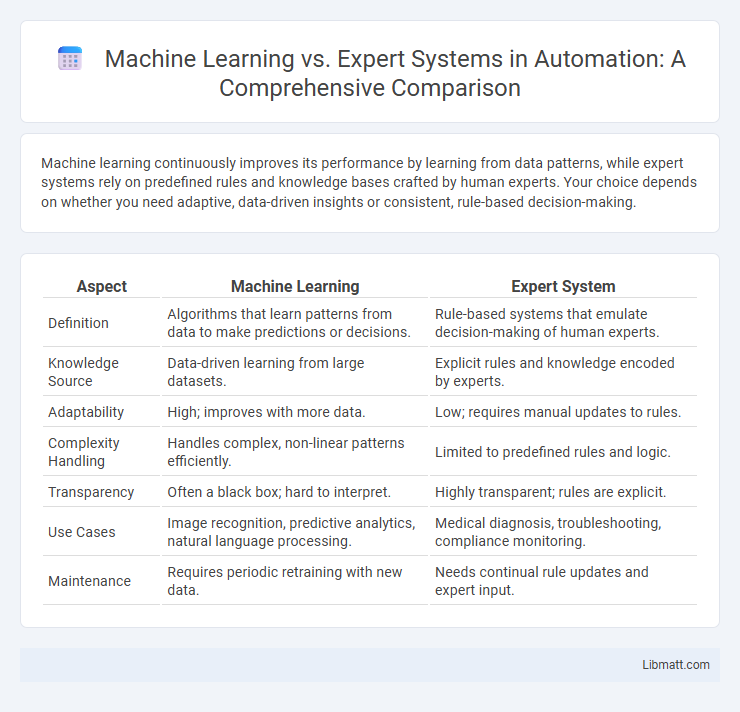Machine learning continuously improves its performance by learning from data patterns, while expert systems rely on predefined rules and knowledge bases crafted by human experts. Your choice depends on whether you need adaptive, data-driven insights or consistent, rule-based decision-making.
Table of Comparison
| Aspect | Machine Learning | Expert System |
|---|---|---|
| Definition | Algorithms that learn patterns from data to make predictions or decisions. | Rule-based systems that emulate decision-making of human experts. |
| Knowledge Source | Data-driven learning from large datasets. | Explicit rules and knowledge encoded by experts. |
| Adaptability | High; improves with more data. | Low; requires manual updates to rules. |
| Complexity Handling | Handles complex, non-linear patterns efficiently. | Limited to predefined rules and logic. |
| Transparency | Often a black box; hard to interpret. | Highly transparent; rules are explicit. |
| Use Cases | Image recognition, predictive analytics, natural language processing. | Medical diagnosis, troubleshooting, compliance monitoring. |
| Maintenance | Requires periodic retraining with new data. | Needs continual rule updates and expert input. |
Introduction to Machine Learning and Expert Systems
Machine Learning is a branch of artificial intelligence that enables systems to learn patterns and make decisions from data without explicit programming. Expert Systems are rule-based AI programs designed to simulate the decision-making ability of a human expert by applying predefined rules and knowledge bases. While Machine Learning emphasizes adaptive algorithms and data-driven insights, Expert Systems rely on static, human-curated knowledge for problem-solving.
Defining Machine Learning: Key Concepts and Approaches
Machine Learning is a subset of artificial intelligence that enables systems to learn patterns from data and improve performance without explicit programming. It encompasses key approaches such as supervised learning, unsupervised learning, and reinforcement learning, each tailored to different types of data and problems. Your choice between Machine Learning and Expert Systems depends on whether adaptability and pattern recognition or rule-based decision-making is more critical for the application.
What Are Expert Systems? Structure and Functionality
Expert systems are AI programs designed to simulate human expertise by using a knowledge base and an inference engine to solve complex problems. Their structure consists of three main components: the knowledge base, containing domain-specific facts and rules; the inference engine, which applies logical rules to the knowledge base to deduce new information; and the user interface, enabling interaction between users and the system. Expert systems function by mimicking decision-making processes of human experts through rule-based reasoning, allowing for explanations and justifications of their conclusions.
Core Differences: Machine Learning vs Expert Systems
Machine Learning relies on algorithms that learn patterns from data, enabling systems to improve performance over time without explicit programming, while Expert Systems use predefined rules and logic based on human expertise to solve specific problems. Machine Learning models adapt dynamically through experience, making them suitable for complex and evolving tasks, whereas Expert Systems operate within the fixed boundaries of their rule libraries, providing consistent but less flexible solutions. Understanding these core differences helps you choose the right technology for tasks requiring adaptability versus precise, rule-based decision making.
Knowledge Representation in Both Paradigms
Machine learning represents knowledge through data-driven models that adapt by identifying patterns within large datasets, enabling automatic improvement without explicit programming. Expert systems rely on structured, rule-based knowledge representation using ontologies, decision trees, or if-then rules manually crafted by domain experts to encode specific expertise. The primary distinction lies in machine learning's probabilistic and dynamic approximations versus expert systems' deterministic and static knowledge bases.
Learning Capability: Adaptability vs Rule-Based Logic
Machine learning systems excel in adaptability by continuously improving their performance through data-driven learning processes, enabling them to handle complex and dynamic environments. In contrast, expert systems rely on pre-defined rule-based logic crafted by human experts, limiting their ability to adapt to new or unforeseen scenarios without manual updates. This fundamental difference highlights machine learning's superior capability in evolving with changing data patterns, while expert systems depend heavily on static knowledge bases for decision-making.
Applications: Use Cases for Machine Learning and Expert Systems
Machine learning is extensively applied in dynamic environments requiring pattern recognition, such as fraud detection in finance, personalized recommendations in e-commerce, and predictive maintenance in manufacturing. Expert systems excel in domains demanding structured decision-making, like medical diagnosis, equipment troubleshooting, and regulatory compliance by encoding expert knowledge into rule-based frameworks. Both technologies enhance decision support, but machine learning adapts from data trends while expert systems rely on explicit knowledge bases.
Advantages and Limitations of Machine Learning
Machine learning offers significant advantages such as the ability to automatically improve performance with experience and to handle large, complex datasets that are difficult for traditional programming methods. Its limitations include dependency on quality training data, potential overfitting, and challenges in explaining decision-making processes due to its often black-box nature. Unlike expert systems that rely on predefined rules, machine learning models can adapt to new patterns but may struggle with interpretability and require extensive computational resources.
Strengths and Weaknesses of Expert Systems
Expert systems excel in domains with well-defined rules and structured knowledge, providing consistent and transparent decision-making processes. Their weaknesses include difficulty in handling ambiguous or incomplete information and limited ability to learn or adapt without manual updates. Unlike machine learning models, expert systems lack scalability and struggle with complex, unstructured data.
Future Trends: The Evolving Role of AI Technologies
Machine learning continues to advance rapidly, enabling AI systems to improve performance through data-driven learning and adaptation, while expert systems rely on pre-defined rules and human expertise. Emerging trends indicate a convergence where hybrid models leverage both machine learning's flexibility and expert systems' domain-specific knowledge to enhance decision-making accuracy and explainability. Your future AI deployments will benefit from incorporating these evolving technologies, maximizing efficiency and reliability in complex applications.
Machine Learning vs Expert System Infographic

 libmatt.com
libmatt.com